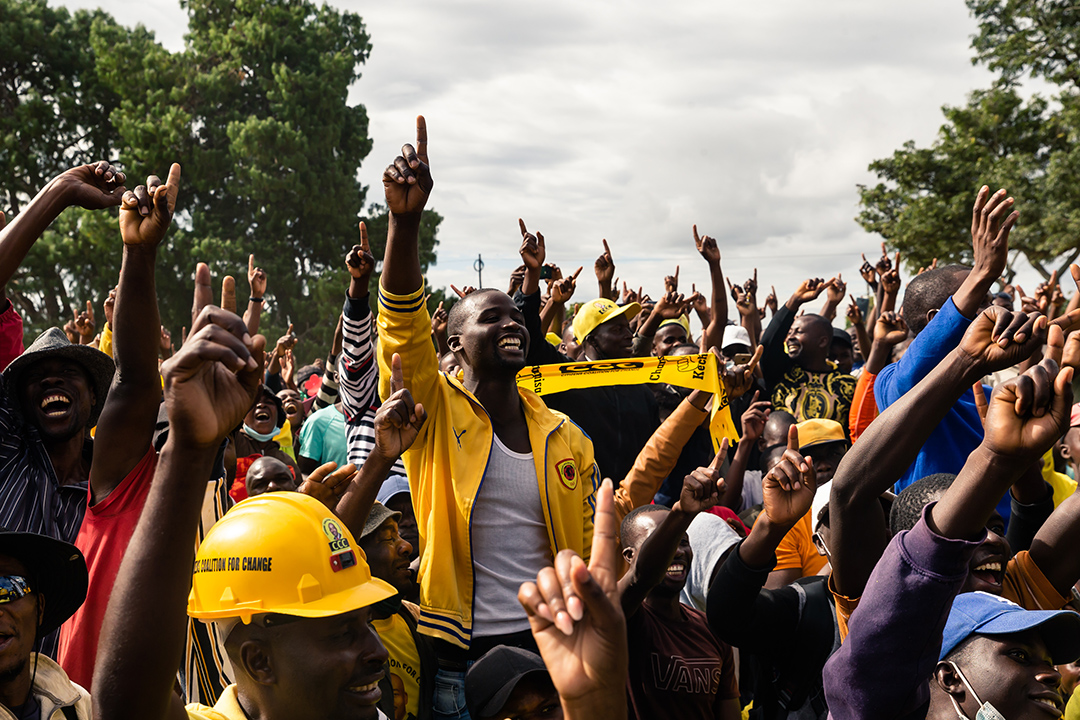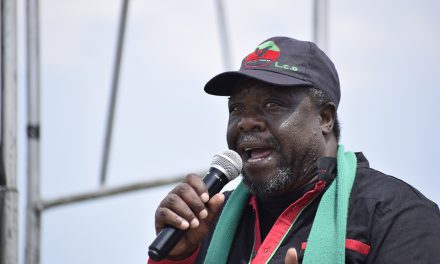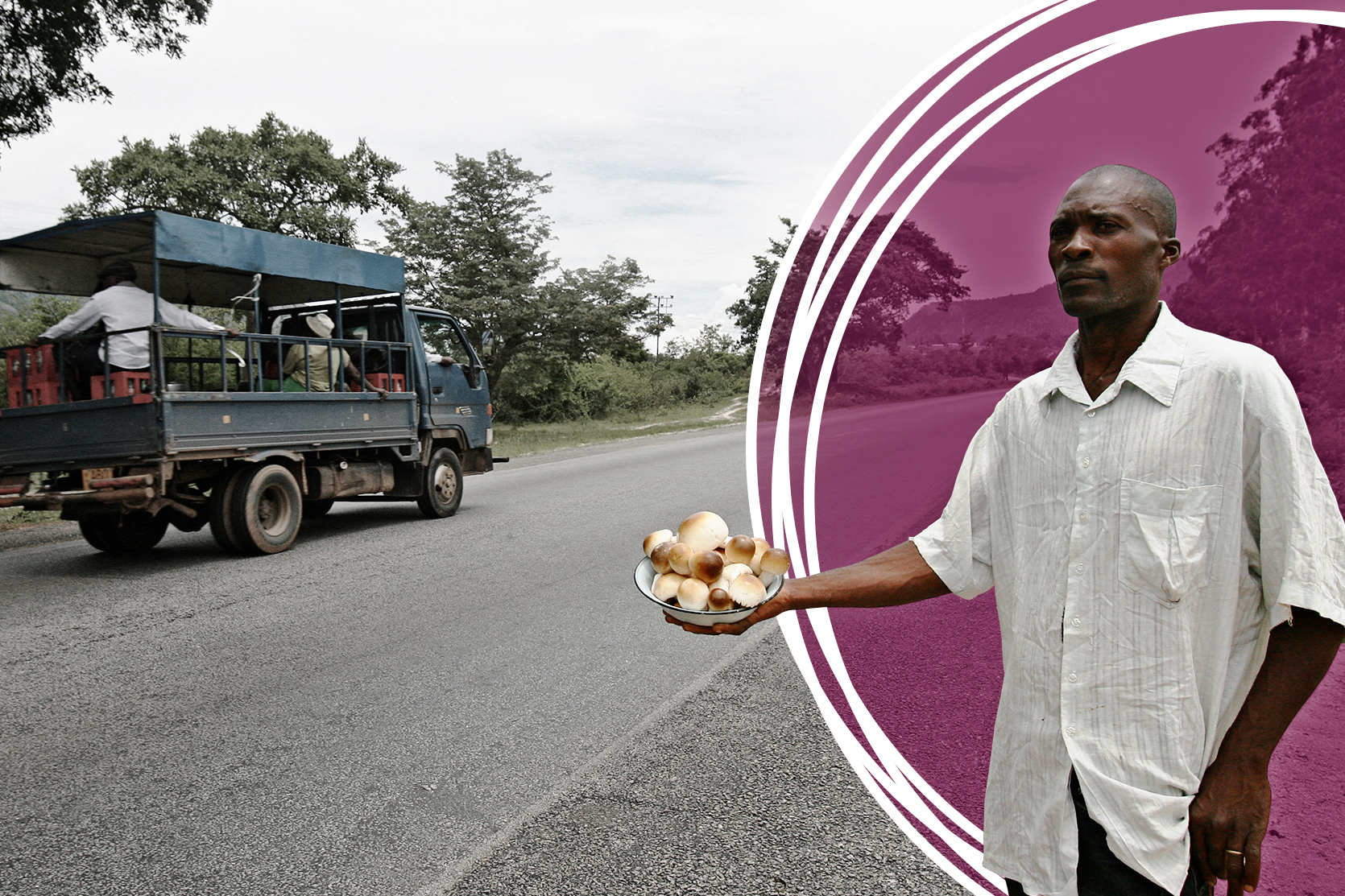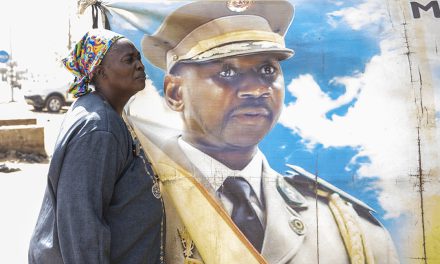Globally, 2022 was not a good governance year. Just as the negative impact of Covid-19 lockdowns was starting to turn around, Russia violated the international order by invading Ukraine. What Putin thought would take a few weeks has turned into a conflict nearly a year long.

Supporters gathered to listen to Zimbabwe main opposition leader Nelson Chamisa of the Citizens Coalition for Change (CCC) address outside Rudhaka Stadium in Marondera where the party was banned from hosting an election campaign rally in the stadium, 12 March 2022. Photo: Jekesai Njikizana/AFP
It seems as if there are few good options for bringing that war to an end. Its global impact has been highly distortionary, especially for African countries. Inflation (particularly food and fuel price) is combined with supply-chain contraction to create stagflation risks — economies afflicted by the dual challenge of sclerotic growth and rising inflation. Economic challenges are too often a precursor to political instability.
For African countries, the assessment was particularly bleak. Indiscriminate lockdowns proved to be an inappropriate governance response to Covid-19, given that hospital capacity was already scarce to begin with and economic activity is more vital to public health than in more developed countries. The crushing of this economic activity has second and third-round effects that will still come home to roost.
Of the 44 countries in sub-Saharan Africa, 16 declined against their democratic scores of the previous year. Mauritius was ranked as the only “full democracy”, with Botswana, Cabo Verde, South Africa, Namibia, Ghana and Lesotho ranking as “flawed democracies”.
Fourteen countries were categorised as “hybrid regimes”, with some features of democracy operating against the backdrop of authoritarian creep or absence of basic civil liberties that typically foment democratic consolidation (such as freedom of association for opposition parties).
The remaining 14 countries ranked as fully authoritarian. West African states were particularly susceptible to growing instability, including hybrid regimes such as Nigeria’s.
The Economist Intelligence Unit noted: “The spread of jihadi groups throughout West Africa, coupled with Nigeria’s increasing inability to act as a regional power broker, has led to increased tension between governments and militaries, creating the conditions for increased factionalisation among competing elites and an increase in coups.”
In the year ahead, 17 African states are set to hold elections, including Nigeria. As the largest country in sub-Saharan Africa, what happens there really matters. Thankfully for Nigeria, the country’s presidential two-term limit is unlikely to be violated.
It has been hard fought for, and Obasanjo’s attempt to acquire a third term in 2006 ultimately locked in the constitutional safeguard against incumbents seeking an extension of their rule in that country. Incumbent Muhammadu Buhari will step down this year, probably to be replaced by Bola Ahmed Tinubu of the ruling All Progressives Congress.
Sierra Leone, Liberia, Togo, Benin, Gabon, Democratic Republic of the Congo, South Sudan, Madagascar and Zimbabwe are also set for either heads of state or legislative elections.
Zimbabwe, of course, is closest to home. According to the Economist Intelligence Unit, the country faces an inflation risk (along with Sudan and Ethiopia) of more than 50%. Its debt-servicing costs are also extremely high, largely due to its unreliable and fast-weakening currency. Standard treatment to stem inflation and strengthen currency is to increase interest rates but such tightening of monetary policy seems unlikely in an election year.
Having said that, the real economy in Zimbabwe is largely informal and the true (black market) currency exchange rates and prices are markedly different to those formally reflected.
It appears highly unlikely that Zimbabwe would be capable of hosting free and fair elections, given the apparent compromised position of the country’s electoral commission and various other problems. They should, therefore, be postponed until such time as they can be credibly conducted.
Given that the political economy outlook across the continent (and the world) is not particularly promising, it is important to reflect on some governance fundamentals. Countries such as Zambia and Kenya, both having changed ruling parties last year at the ballot box — peaceably — look set for solid economic growth if the political leadership in both countries adopts rational policies that lock in sustainable growth.
Zambia is copper-wealthy and likely to attract increasing investment, though it will surely have to improve its mining policy to do so. Over-reliance on copper could still be a problem, however. Kenya appears to be more fortunate in that it is already more economically diversified.
Resource-wealthy economies across the continent should be performing far more effectively than they are. Nigeria, Angola, Gabon, Ghana, Equatorial Guinea and Chad have natural fossil fuel prospects which, if well governed, would constitute a potential boon for their economies (though this line of reasoning is fraught with difficulties given the risk of stranded assets in the longer run).
Similarly, mineral wealth in Botswana, South Africa, the Democratic Republic of the Congo, Namibia, Nigeria, Tanzania and Zimbabwe should translate into strong export growth which renders import-driven inflation less taxing on these countries, though this is often only a short-term benefit.
Unlike Kenya, however, these countries are all susceptible to varying manifestations of the resource curse. Poor governance at the time of discovering commercially viable resources has typically undermined the quality of the institutions on which a country’s future success depends.
If African countries are to perform better than currently predicted, a concerted focus will have to be directed towards improving government effectiveness and strengthening citizens’ abilities to hold their governments to account.
Resource wealth tends to create windfall rents for governing elites, who appropriate and distribute those rents to their patronage networks if left unchecked by the citizenry. Building checks and balances to prevent this dynamic is critical to future prosperity.
This is what institution-building is all about. Institutions are the social systems — beliefs, norms, values and culture — that motivate regular human behaviour. In other words, they provide the scaffolding for generating incentives.
Democracy is no panacea for creating the kind of norms and values that create accountable political leadership. On the contrary, democracy will typically only thrive if it emerges from a pre-existing norm of holding leaders to account. This norm has to be strengthened across the continent.
A second concerning feature of resource wealth in the absence of strong institutions is that it tends to crowd out a country’s manufacturing competitiveness. Raw material exports increase demand for a country’s currency, inflating its value. This makes imports more expensive and manufactured products similarly more expensive.
Given that premature deindustrialisation — countries moving out of manufacturing at lower rates of per capita income, and sooner, than their industrialised counterparts — is particularly prevalent in southern Africa, an over-reliance on natural resource exports is a long-term problem.
Simply exporting resources will not solve the growing youth unemployment problem. Smart (and preferably green) manufacturing is the only channel through which employment growth seems likely to start and be sustained.
Stronger institutions that enforce political accountability are a necessary (if insufficient) condition for transforming resource wealth into broad-based economic prosperity. It is therefore critical that civil society continues to demand such accountability from our leaders.
Of course, it would also help if state-owned entities like Eskom could keep the lights on (and power manufacturing) but its inability to do so should also open the playing field for a more competitive field of independent power suppliers to feed national grids (or create micro-grids where national transmission grids do not yet exist).
Clearly, there is much work to do to ameliorate the current negative outlook and improve governance on the continent in 2023.
This article first appeared in the Mail & Guardian on 12 January 2023.
Dr Ross Harvey is a natural resource economist and policy analyst, and he has been dealing with governance issues in various forms across this sector since 2007. He has a PhD in economics from the University of Cape Town, and his thesis research focused on the political economy of oil and institutional development in Angola and Nigeria. While completing his PhD, Ross worked as a senior researcher on extractive industries and wildlife governance at the South African Institute of International Affairs (SAIIA), and in May 2019 became an independent conservation consultant. Ross’s task at GGA is to establish a non-renewable natural resources project (extractive industries) to ensure that the industry becomes genuinely sustainable and contributes to Africa achieving the Sustainable Development Goals (SDGs). Ross was appointed Director of Research and Programmes at GGA in May 2020.







